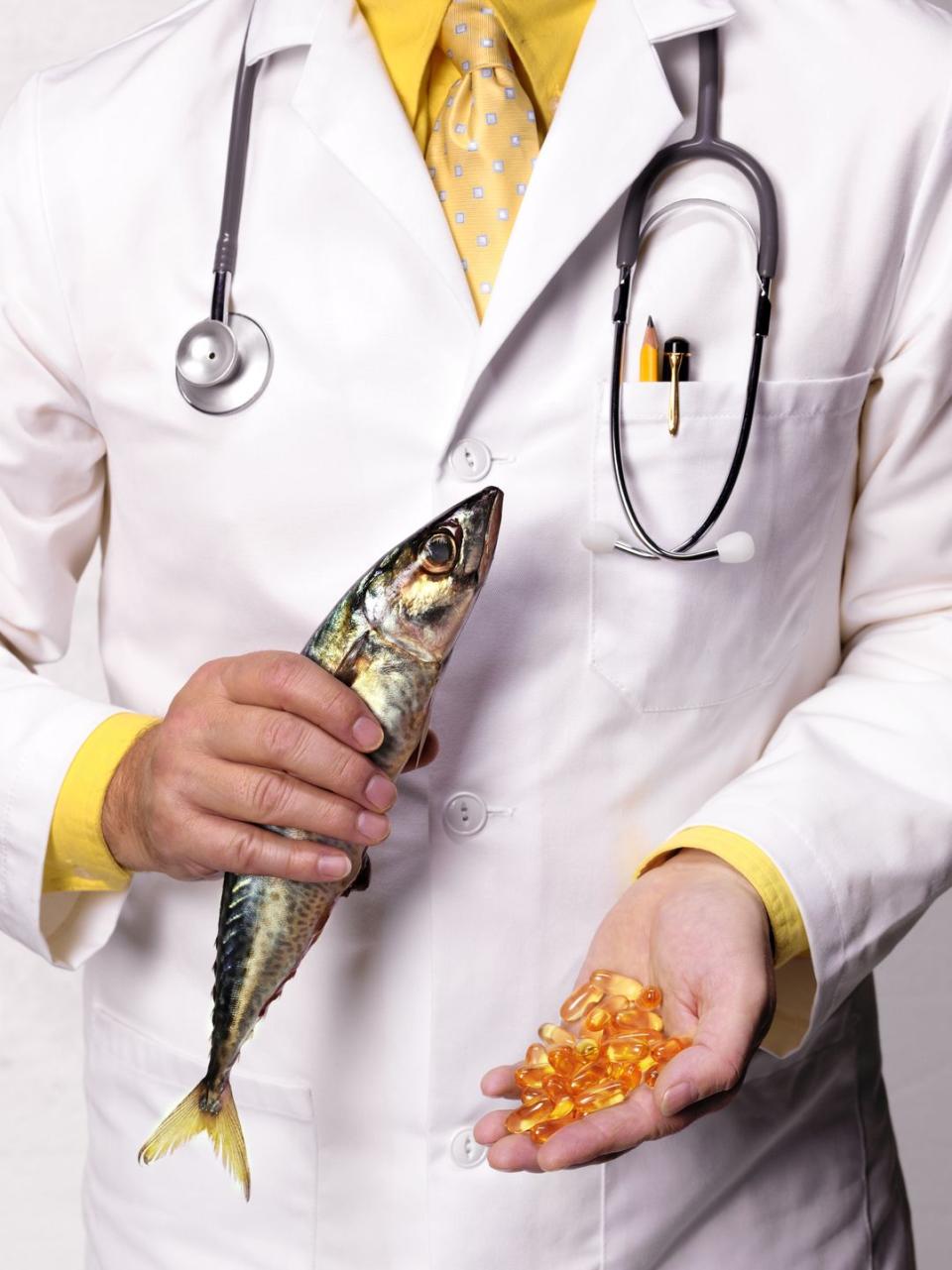Fish Oil Is the New Snake Oil

MAYBE WE haven't struck oil after all.
Omega-3 fatty acid supplements were once thought to deliver the same cancer-fighting, heart-saving, brain-preserving benefits as real fish—but without the stinky hassle of cooking or eating something many Americans don’t cook or eat very much of.
That’s why, when omega-3 dietary supplements hit the U.S. market a few decades ago, people were immediately hooked—and supplement manufacturers started pulling in the big bucks. The fish oil market has a 2022 projected value of $12.8 billion and is forecasted to grow an additional 6.8 percent in ten years to $23.8 billion.
Unfortunately, a large and growing body of research from the last decade warns that omega-3 fatty acid supplements may now have a catch.
While research in the 1990s initially suggested benefits from dietary fish oil supplementation, these new studies—including several high-profile reviews published in trusted journals—no longer support many of the original health claims marketers used to sell their supplements.
So if you're taking an omega-3 supplement because you think it may prevent heart disease, boost your brainpower, slow the progression of age-related macular degeneration, or stave off prostate cancer—you might want to reconsider.
Is fish oil just another form of snake oil? Quite possibly. Despite early buy in from doctors and their respective professional associations, many are now making an about-face on the supplement in terms of recommendations.
Luckily, there's a simple step you can take, starting today, to drastically improve your heart health (not to mention your overall health in general) and it doesn't involve buying or taking a single pill.
What Is Fish Oil Anyway?
The link between consuming fish oil and good health go way back.

The Bible has anecdotes of people using fish gallbladders to treat blindness. The Spaniards believed fish bile cured madness. And when your grandpa was a pup, he probably had to swallow cod-liver oil to prevent rickets, a bone disorder caused by vitamin deficiency.
But modern research into the protective health effects of oily fish began around the 1970s, when scientists homed in on polyunsaturated fat intake. That’s when a landmark study from Denmark revealed low rates of coronary artery disease and diabetes among indigenous Greenlanders with a fish-rich diet.
From that point on, the scientific community quickly began building a case for the link between fish consumption and good health.
Later research identified the polyunsaturated omega-3 fatty acids (EPA and DHA, primarily) as the beneficial silver bullet; these are found in high concentrations in such oily fish as sardines, mackerel, and herring. The findings implied that omega-3s from fish lowered blood levels of triglycerides, potentially reducing the risk of conditions like heart disease and cancer.
Additional data over the ensuing decades appeared to support these claims, and by the mid-1990s, the American Heart Association was all in. In 1994, it staged a conference about the therapeutic benefits of omega-3 fatty acids. Supplement companies took notice.
Is Taking a Fish Oil Supplement as Good as Eating Fish?
AMERICANS DON'T really do oily fish.

Average intake of omega-3-rich fish among U.S. men is a measly 1.4 ounces a week, a 2014 Nutrition Journal study found. Some guys may not like the taste; others might think fish is too expensive, too smelly, or too complicated to cook.
So the supplement industry, sensing an untapped market, decided to address those concerns. The result: a convenient capsule that delivered the goods in one easy swallow. Later the formula was refined to eliminate the fish burps of early omega-3 supplements.
Supplement producers started sending out fleets of warship-size trawlers to harvest omega-3-rich fish. They brought in lobbyists to push legislation that would codify the benefits of fish oil into federal product labeling guidance. Those efforts proved so successful that by 2004, the FDA allowed dietary fish oil supplement labels to state that the capsules may reduce coronary heart disease risk.
The government’s optimism remained guarded, however; the FDA stated that the research was “not conclusive.” But that disclaimer did little to stem the tide of American consumers hungry for omega-3s in a capsule—or companies that were eager to deliver it to them.

But when you look at the entirety of omega-3 research, one thing sticks out: Most of the data on the benefits of omega-3s came from studies that looked at consumption of fish, not fish oil supplements. Only recently have the supplements been studied in a more comprehensive way, and the results raise worrisome questions.
One concern is that over-the-counter supplements may not deliver the fish oil dosage promised on the label. In fact, of 32 commercially available supplements analyzed by researchers in Australia and New Zealand in 2014, only three had levels of EPA and DHA equal to or greater than those advertised on the label. What’s more, two-thirds of the research samples contained less than 67 percent of the EPA and DHA advertised.
So how does this happen? Scientists speculate that in the production process, fish oil may become exposed to the air. This exposure can result in oxidization, reducing the total EPA and DHA concentration of the oil. In fact, some liquid gels contain additional flavorings meant to mask the telltale rancid odor of oxidized fish oil, according to a 2014 report published by Consumer Lab.
“Fish oils, like any nutritional supplement, are not regulated by the FDA the way prescription drugs are, so you can never be quite sure of what you’re getting,” says James Stein, M.D., a professor of cardiovascular research at the University of Wisconsin. That doesn’t necessarily mean they’re dangerous; it just means you might not be getting all you’ve paid for.
And even if your supplement does deliver the right dose, you may not be receiving all the promised health benefits.
Yes, some smaller studies have revealed heart health benefits, but the bulk of the research has yet to prove that nonprescription supplements can reduce the risk of cardiovascular-related death, delay cognitive decline, ease depression, or prevent prostate cancer—four of the most promising claims regarding omega-3s.
“Many of fish oil’s earlier touted benefits have not been replicated in large randomized controlled clinical trials,” says MH advisor P. Murali Doraiswamy, M.D., of the Duke Institute for Brain Sciences. “The hype exceeds the science.”
Should You Take a Fish Oil Omega-3 Supplement?
MORE LONG-TERM research is needed to see if over-the-counter omega-3 supplementation can live up to the buzz.

For now, if you want the preventive benefits of omega-3s, especially for your heart, your best bet is to eat real fish.
“Studies show that generally healthy people who eat more fish and have good blood levels of omega-3s have a lower risk of fatal heart disease,” says Dariush Mozaffarian, M.D., dean of the Friedman School of Nutrition Science & Policy at Tufts University. Omega-3 effects in controlled trials include several benefits: improved heart rate, enhanced blood vessel function, and greater oxygen flow to the heart itself.
The Centers for Disease Control and prevent backs this up. "Extensive research has been done on omega-3s, especially the types found in seafood (fish and shellfish) and fish oil supplements," according to its website. "Research indicates that omega-3 supplements don’t reduce the risk of heart disease. However, people who eat seafood one to four times a week are less likely to die of heart disease."
Plus, fish is an excellent source of protein, vitamins, and minerals, and it’s lower in calories than many other protein-rich foods. “Fish is more than just omega-3s,” Dr. Mozaffarian says. “It also contains zinc, important amino acids, and vitamin D.”
Still not biting because of the taste or smell? The good news is that you don’t have to subsist entirely on anchovies and sardines. A variety of fish species, with diverse flavor profiles, pack a wallop of omega-3s.
And don’t let concerns about mercury in seafood dissuade you from eating it. A JAMA review found that the heart health benefits of fish outweigh the risks associated with consuming toxins found in some fish. If you’re still worried, eat smaller seafood (try shrimp or sardines), which don’t carry the toxin load of larger swimmers (like swordfish), says Men’s Health nutrition expert Mike Roussell.
So here’s the bottom line for the average guy: Eat at least two servings of fish that are high in omega-3s each week and cook them in a healthy way to avoid loading up on excess calories. (Sorry, fish-and-chips lovers.)
If you just can’t stomach a fish-forward diet, ask your doctor if you might need a prescription for omega-3s to make up for the lack of seafood on your plate. But that should be a last resort. Also be aware that fish oil supplements, both in prescription and over-the-counter forms, have the ability to thin your blood and increase your risk of bleeding and bruising.
“If you regularly eat fatty fish, supplementation isn’t necessary,” says Alan Aragon, M.S., author of The Lean Muscle Diet.
In even simpler terms, go fish. Here are nine omega-3 powerhouses to try.
Fish With the Highest Amounts Of Omega-3
You Might Also Like

